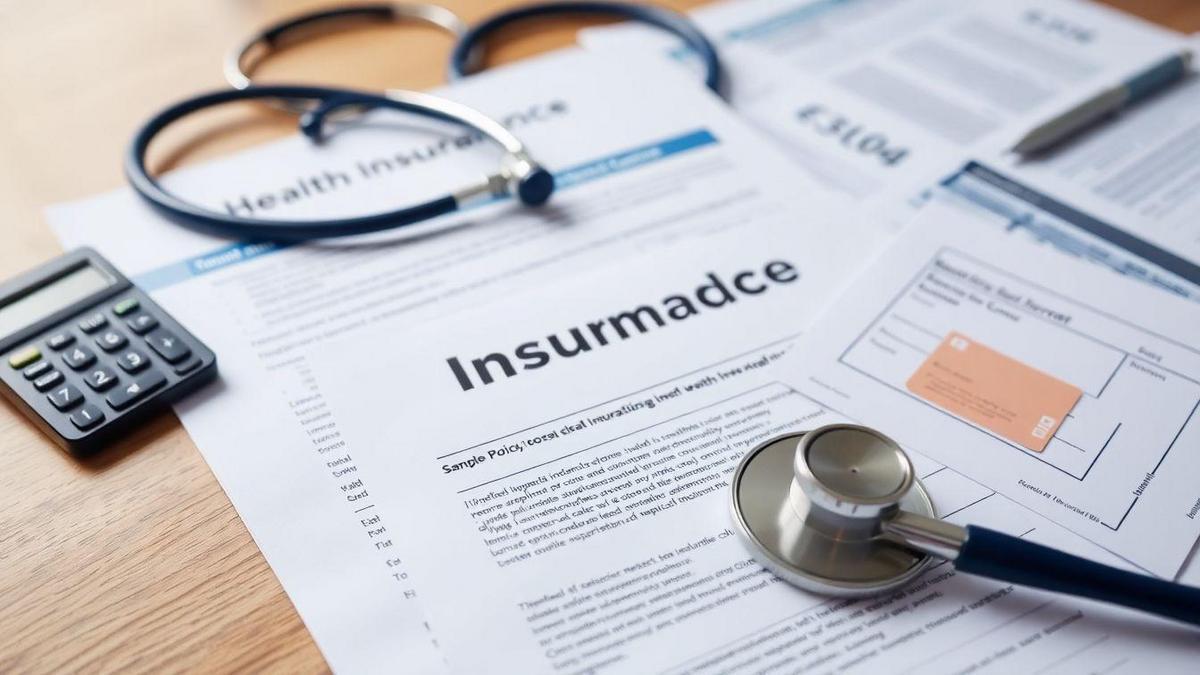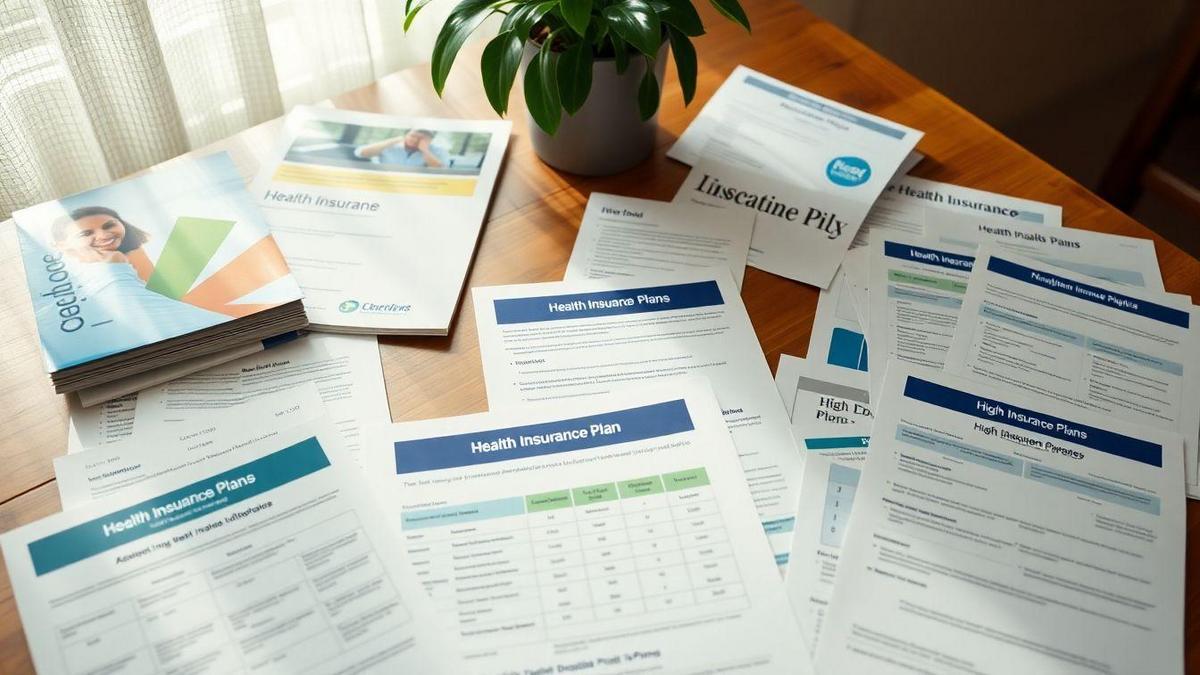Health Insurance can feel like a complex puzzle, one that you didn’t ask to solve but somehow ended up with. Don’t worry! In this guide, you’ll unravel the mysteries of health insurance, from why you need it (Spoiler: It’s like a safety net for your wallet) to understanding all those confusing terms like deductibles and copayments. We’ll also tackle the exciting world of plans, networks, and even some tax magic with Health Savings Accounts! Get ready for a fun ride through the wild waters of health insurance so you can make sense of it all without pulling your hair out!
Key Takeaways
- Know what you need – health plans can be like pizza toppings, choose wisely!
- Compare prices – don’t pay for the “extra cheese” if you don’t need it!
- Check your doctors – make sure your fave doc is on the plan, no surprise breakups!
- Read the fine print – avoid surprises, like finding out your plan doesn’t cover unicorns!
- Ask questions – be the curious cat, it’s your health and your money!

Understanding Health Insurance Basics
What is Health Insurance Anyway?
Alright, let’s break it down. Health insurance is like that trusty umbrella you carry on a rainy day. You might not think you need it until you find yourself soaked to the bone! In simple terms, it’s a way to help you pay for medical expenses. You pay a monthly fee (called a premium), and in return, your insurance company helps cover your doctor visits, hospital stays, and even that time you decided to wrestle with a lawnmower.
Here’s a quick table to show you what you get:
| What You Pay | What You Get |
|---|---|
| Monthly Premium | Coverage for doctor visits |
| Deductibles | Help with hospital bills |
| Co-pays | Coverage for medications |
Why You Need Health Insurance in Your Life
Imagine you wake up one morning, and your body feels like it went ten rounds with a grizzly bear. You need to see a doctor, but you remember your wallet is as empty as a kid’s piggy bank after a candy spree. This is where health insurance swoops in like a superhero!
Without it, you might be paying big bucks for a simple check-up. And let’s be honest, nobody wants to choose between eating ramen noodles for the rest of the month or getting that pesky cough checked out.
The Importance of Health Coverage for Everyone
Now, you might think health insurance is just for those who have a knack for finding trouble. But guess what? It’s for everyone! From the couch potato to the weekend warrior, everyone can benefit.
Here are a few reasons why:
- Protects Your Wallet: Medical costs can skyrocket faster than a kid on a sugar high.
- Peace of Mind: You can sleep better knowing you won’t face a financial crisis if you need medical care.
- Access to Better Care: With insurance, you can see doctors and specialists without breaking the bank.
So, whether you’re a daredevil or just someone who prefers to binge-watch shows, having health insurance is like having a safety net. It’s there to catch you when life decides to throw a curveball!

Types of Health Insurance Plans
HMO vs. PPO: The Ultimate Showdown
Ah, the classic battle of HMO (Health Maintenance Organization) and PPO (Preferred Provider Organization). It’s like choosing between pizza and tacos—both are delicious, but one might just be more your style!
HMO plans are like that friend who insists on sticking together. You need a primary care doctor who will be your go-to guru. If you want to see a specialist, you better get that doctor’s blessing. It’s all about teamwork, baby! But on the flip side, these plans usually come with lower premiums. So, if you’re looking to save some dough while being part of a health squad, HMO might be your jam.
Now, let’s talk PPO. This plan is the free spirit of health insurance. You can see any doctor you want, anytime! No need for a referral. Just waltz into any office that accepts your plan. However, this freedom comes at a price—higher premiums. So, if you love options and don’t mind spending a bit more, PPO might just be your ticket to health heaven.
| Feature | HMO | PPO |
|---|---|---|
| Doctor Choice | Limited | Broad |
| Referrals Needed | Yes | No |
| Premiums | Lower | Higher |
| Out-of-Network Coverage | No | Yes |
High Deductible Plans: Are They Worth It?
High deductible plans are like that mystery box you see on a game show. You never quite know what you’re getting! These plans have lower premiums but require you to cough up a higher deductible before the insurance kicks in.
So, are they worth it? Well, if you’re generally as healthy as a horse, you might save a pretty penny. But if you find yourself in the doctor’s office more often than you’d like, you could end up spending a lot more than you bargained for. Think of it like a game of poker—bet wisely!
Choosing the Right Plan for Your Needs
When picking a health insurance plan, think about what you need. Are you a frequent flyer at the doctor’s office, or do you only go for the big stuff? Here’s a quick checklist to help you decide:
- Budget: What can you afford monthly?
- Doctor Preferences: Do you have a favorite doctor?
- Health Needs: Do you have ongoing health issues?
- Family: Are you covering a whole crew or just yourself?
Remember, the best plan is the one that fits you like a glove, not a potato sack!

Premium Rates: What You Should Know
How Are Premium Rates Determined?
So, you wanna know how those pesky premium rates are set, huh? Well, grab your favorite snack and let’s dive in! Premium rates are like a secret recipe that combines a few key ingredients:
| Ingredient | Description |
|---|---|
| Age | Older folks usually pay more. Sorry, grandpa! |
| Location | Living in a big city? Your rates might be higher! |
| Health History | If you’ve had more doctor visits than a cat has lives, expect a higher rate! |
| Coverage Type | More coverage? More money! It’s that simple. |
| Lifestyle Choices | Smoking? Well, that’ll cost you. Quit now! |
So, while it may feel like a game of chance, it’s really just a mix of these factors that determines how much you’ll pay for your health insurance.
Tips to Lower Your Health Insurance Premiums
Now, let’s talk about how to keep those premium rates from eating your wallet! Here are some tips that might just save you a couple of bucks:
- Shop Around: Don’t settle for the first offer. It’s like dating; you gotta see what’s out there!
- Increase Your Deductible: Yes, it means you’ll pay more out of pocket if something happens, but hey, you’ll save on your monthly bill!
- Stay Healthy: Exercise and eat your veggies! Your body (and your wallet) will thank you.
- Take Advantage of Discounts: Some insurers offer discounts for things like being a good driver or being a member of certain organizations. Check it out!
The Secret Sauce to Affordable Health Coverage
Alright, here’s the juicy part! The secret sauce to affordable health coverage is really about being smart. Imagine you’re a detective, piecing together clues to find the best deal. Here’s how to do it:
- Know What You Need: Don’t pay for coverage you won’t use. If you’re young and healthy, maybe skip on those fancy add-ons.
- Consider a Health Savings Account (HSA): It’s like a piggy bank for medical expenses! You can save money tax-free.
- Stay Informed: The health insurance world can change faster than a squirrel on caffeine. Keep up with the latest news and changes.
By following these steps, you can make sure you’re not just throwing your money out the window!

Navigating Deductibles and Copayments
What is a Deductible and Why Should You Care?
Alright, folks, let’s break this down. A deductible is like that annoying friend who always shows up uninvited. You only get to enjoy the party (aka your health insurance benefits) after you’ve paid a certain amount out of your own pocket. Think of it as your “entry fee” to the health care club.
For example, if your deductible is $1,000, you’ll need to cough up that amount before your insurance starts chipping in. So, if you find yourself in the doctor’s office for that pesky cold, you’ll be paying the whole bill until you hit that $1,000 mark.
Why should you care? Because knowing your deductible helps you plan your finances. It’s like knowing how much you can spend at the fair without going broke.
Copayments: The Price You Pay for Doctor Visits
Now, let’s talk about copayments (or copays, if you’re feeling casual). This is the flat fee you pay each time you see a doctor. It’s like paying for a ticket to see your favorite band, but in this case, the band is your doctor, and the music is… well, your health.
Here’s a quick look at what you might pay:
| Type of Visit | Typical Copayment |
|---|---|
| Primary Care Visit | $20 |
| Specialist Visit | $40 |
| Emergency Room Visit | $100 |
So, if you visit your primary care doc for a sore throat, you might pay $20. Easy peasy, right? But if you end up in the emergency room for a wild rollercoaster accident (we’ve all been there), you’re looking at a $100 ticket. Ouch!
Understanding Your Out-of-Pocket Costs
Now, let’s connect the dots. Your out-of-pocket costs include both your deductible and your copayments. It’s like a combo meal at your favorite fast food joint. You pay for the burger (deductible) and the fries (copayments) together.
Let’s say you have a $1,000 deductible and you’ve paid $200 in copays this year. Your total out-of-pocket costs so far? $1,200.
And remember, once you hit your deductible, your insurance usually starts covering a larger portion of your medical bills. This is the part where you can breathe a sigh of relief and maybe even treat yourself to a milkshake!

The Out-of-Pocket Maximum Explained
What Happens When You Hit Your Out-of-Pocket Maximum?
Ah, the out-of-pocket maximum—the magical number that makes your wallet breathe a sigh of relief! When you hit this limit, it’s like winning the health insurance lottery. You’ve paid your dues, and now your insurance kicks in to cover 100% of your medical costs for the rest of the year. No more worrying about co-pays or deductibles. It’s party time! 🎉
Here’s what happens next:
- Insurance Covers Everything: After you reach your maximum, your health insurance steps up to the plate like a superhero.
- No More Bills: You can finally stop hiding from those medical bills. They’ll be as rare as a unicorn in your mailbox.
How to Use Your Out-of-Pocket Maximum to Your Advantage
Don’t just sit back and relax! You can actually leverage this number to save some cash. Here’s how:
- Plan Your Medical Visits: If you know you’re close to your limit, schedule those check-ups, surgeries, or treatments. It’s like a buffet—you want to get your money’s worth!
- Use In-Network Providers: Stick with in-network doctors. They’re like your best friends in the health insurance world; they won’t charge you an arm and a leg.
- Keep Track of Your Spending: Use a notebook, an app, or even a napkin to jot down your medical expenses. You don’t want to miss out on hitting that sweet spot!
The Benefits of Knowing Your Financial Limits
Understanding your out-of-pocket maximum isn’t just smart; it’s downright genius! Here’s why:
| Benefit | Description |
|---|---|
| Financial Peace of Mind | Knowing your limit helps you sleep better at night. No more tossing and turning over bills! |
| Smart Budgeting | You can plan your finances better and avoid surprises. It’s like knowing the weather before going out! |
| Maximize Your Benefits | You can use your health insurance to its fullest. Think of it as a treasure map leading you to savings! |
So, keep your eyes on that out-of-pocket maximum. It’s your ticket to health insurance freedom!

Network Providers: Why They Matter
What Are Network Providers and How Do They Work?
Alright, let’s break it down! Network providers are like the VIPs of your Health Insurance plan. They are doctors, hospitals, and clinics that have teamed up with your insurance company. Think of them as your insurance buddies who agree to give you services at a lower price. They work by signing contracts with the insurance company, which means they promise to provide care at discounted rates. You get to save some dough while getting treated!
In-Network vs. Out-of-Network: The Costly Difference
Now, here’s where things get a little spicy. You’ve got two types of providers: in-network and out-of-network.
| Provider Type | Cost to You | Coverage Details |
|---|---|---|
| In-Network | Lower co-pays | Insurance covers more of the cost |
| Out-of-Network | Higher co-pays | You pay a chunk more, yikes! |
In-network providers are like the friendly neighborhood superheroes. They save you money and keep you healthy. On the flip side, out-of-network providers can feel like that sneaky villain who charges you extra just for the fun of it. So, if you don’t want to break the bank, stick with the in-network folks!
Finding the Right Doctors in Your Health Insurance Network
Now, how do you find the right doctors in your health insurance network? It’s easier than finding a needle in a haystack—trust me!
- Check Your Insurance Directory: Most insurance companies have a list of in-network providers on their websites. It’s like a treasure map, but instead of gold, you find doctors!
- Ask Around: Friends and family can be a goldmine of info! They might know the best in-network docs who won’t make you cringe at the co-pay.
- Call Your Insurance Company: If you’re still scratching your head, just pick up the phone! They’ll help you find a doctor who fits your needs like a glove.
Remember, finding the right doctor is like dating. You want someone who understands you, is in your network, and won’t make you cry at the bill!

Health Savings Accounts: A Smart Move
What is a Health Savings Account (HSA)?
A Health Savings Account (HSA) is like a piggy bank, but instead of coins, you stuff it with cash for your medical expenses. You can only open one if you have a high-deductible health plan (HDHP). It’s a special account that lets you save money tax-free for those unexpected doctor visits, surprise bills, or that time you thought you could cure a cold with a spoonful of honey and a lot of wishful thinking.
How HSAs Can Help You Save Big on Medical Costs
HSAs are like your financial superhero. They swoop in to help you save money on medical costs. Here’s how they work:
- You contribute money: You can put money in your HSA before taxes. This means you’re saving money before Uncle Sam takes his cut.
- Grow your funds: Your HSA can earn interest, so your money can grow while you’re busy trying to remember if you took your vitamins today.
- Spend wisely: When you use that money for qualified medical expenses, it’s like finding a hidden treasure – you don’t pay taxes on it!
Here’s a quick comparison table to show how HSAs stack up against regular savings accounts:
| Feature | HSA | Regular Savings Account |
|---|---|---|
| Tax-Deductible Contributions | Yes | No |
| Tax-Free Growth | Yes | No |
| Tax-Free Withdrawals | For medical expenses only | Yes, but taxed |
| Use It or Lose It | No, it rolls over year to year | Yes, usually has limits |
The Tax Benefits of Having an HSA
Now, let’s talk about the juicy part: the tax benefits. Having an HSA is like finding a cheat code for taxes. Here’s what you get:
- Pre-Tax Contributions: When you put money in your HSA, it’s like getting a discount on your paycheck. You don’t pay taxes on that money!
- Tax-Free Growth: Your money grows without Uncle Sam breathing down your neck. It’s like a garden that flourishes without any weeds.
- Tax-Free Withdrawals: When you take money out for medical expenses, it’s also tax-free! It’s like getting a free pass to the amusement park, but instead, you’re just going to the doctor.
In summary, HSAs are a fantastic way to save for medical costs while enjoying some serious tax breaks. So, if you’re looking to save money and keep your health expenses in check, an HSA might just be the golden ticket you’ve been waiting for.

Claims Processing: The Behind-the-Scenes Action
How Claims Processing Works in Health Insurance
So, you’ve just had a visit to the doctor, and now it’s time to play the waiting game. What happens next? Well, claims processing is like a secret handshake in the world of Health Insurance. Here’s how it goes down:
- Doctor’s Office: After your appointment, the doctor sends your claim to the insurance company. Think of it as sending a postcard from vacation—”Wish you were here!”
- Insurance Company: They receive the claim and start their detective work. They check if the services were covered and how much they will pay. It’s like figuring out if you can afford that fancy dinner after all!
- Payment: If everything checks out, they send the payment to the doctor and a summary to you. If they find a hiccup, they might send it back for more info. Cue the dramatic music!
Tips to Ensure Your Claims Get Paid Quickly
Want to speed up the claims process? Here are some tips that might just do the trick:
- Double-Check Your Info: Make sure your details are correct. Misspellings can lead to delays. It’s like sending a letter to Santa with the wrong address!
- Follow Up: Don’t be shy! If you haven’t heard back in a while, call the insurance company. Think of it as sending a friendly nudge, like asking your friend if they’ve finished that Netflix show yet.
- Know Your Coverage: Be aware of what your plan covers. It’s like reading the fine print before signing up for a gym membership. You don’t want to be surprised by hidden fees!
| Tip | Explanation |
|---|---|
| Double-Check | Ensure all information is accurate to avoid delays. |
| Follow Up | A quick call can clear up confusion and speed things up. |
| Know Your Coverage | Understanding your benefits helps prevent surprises. |
The Mystery of Claims: Solved!
So, there you have it! The mystery of claims processing isn’t as puzzling as it seems. With a little knowledge and some proactive steps, you can navigate the world of Health Insurance claims like a pro. Remember, it’s all about staying informed and not being afraid to ask questions.

Pre-Existing Conditions: What You Need to Know
How Pre-Existing Conditions Affect Your Health Insurance
So, you’ve got a pre-existing condition? Don’t worry, you’re not alone! It’s like being part of a club that no one really wants to join. But here’s the kicker: health insurance companies used to treat pre-existing conditions like they were a bad haircut—something to avoid at all costs. They’d charge you more or even deny you coverage. Yikes!
Now, how do these conditions affect your health insurance? Well, if you have a condition that existed before you signed up for your plan, the insurer might try to wiggle out of covering related treatments. But don’t let that get you down!
| Pre-Existing Condition | Insurance Coverage Impact |
|---|---|
| Asthma | May have higher premiums |
| Diabetes | Coverage for routine care |
| Heart Disease | Possible exclusions |
The Good News About Pre-Existing Conditions Today
Here’s the good news: thanks to the Affordable Care Act (ACA), health insurance companies can’t deny you coverage just because of a pre-existing condition anymore. It’s like finally getting a ticket to the concert you’ve always wanted to see! So, if your health isn’t perfect, you can still get coverage.
And guess what? You can’t be charged more just because you have a pre-existing condition. That’s right! You can breathe a little easier knowing that your insurance won’t break the bank just because you have a history of health issues.
Your Rights Regarding Pre-Existing Conditions
Now, let’s chat about your rights. You’ve got some powerful ones! Here’s a quick rundown:
- Coverage: You have the right to get coverage for your pre-existing condition.
- No Denial: Insurance companies can’t deny you based on your health history.
- Fair Pricing: You can’t be charged more just because of your condition.
So, if you find yourself in a sticky situation with your health insurance, remember you’ve got rights on your side. You’re not just a number; you’re a person with a story!
Conclusion
So there you have it! You’ve journeyed through the wild and wacky world of health insurance, and hopefully, you’re feeling a bit more like a savvy insurance ninja than a confused kitten. Remember, choosing the right plan is all about knowing your needs, comparing options, and keeping an eye out for those sneaky costs. Think of it as navigating a maze—sometimes you hit a wall, but with the right tools, you’ll find your way out with a smile (and maybe a few extra bucks in your pocket).
Now, go forth and conquer the insurance jungle! Just keep in mind that health insurance is your trusty sidekick, ready to swoop in and save the day when life throws you a curveball. And hey, if you’re hungry for more knowledge and tips, don’t forget to check out more articles at shopfinancia.com. Happy reading!
Frequently asked questions
What is health insurance?
Health insurance is like a magic shield! It helps you cover medical bills when you’re not feeling well. A superhero for your wallet!
Why do I need health insurance?
Imagine getting hit by a truck made of medical bills. Ouch! Health insurance keeps you safe from that disaster and saves you a ton of money.
How do I choose the right health insurance plan?
Think of it like dating! Look for a plan that fits your needs, makes you feel good about yourself, and doesn’t ghost you with hidden costs.
Can I save money with health insurance?
Absolutely! With the right plan, you can save big bucks. You’ll look like a financial genius while getting your health on!
What if I don’t have health insurance?
Oh boy! It’s like going to a buffet but you’re broke. You can’t pay for the food you want. Health insurance is your all-you-can-eat medical fix!